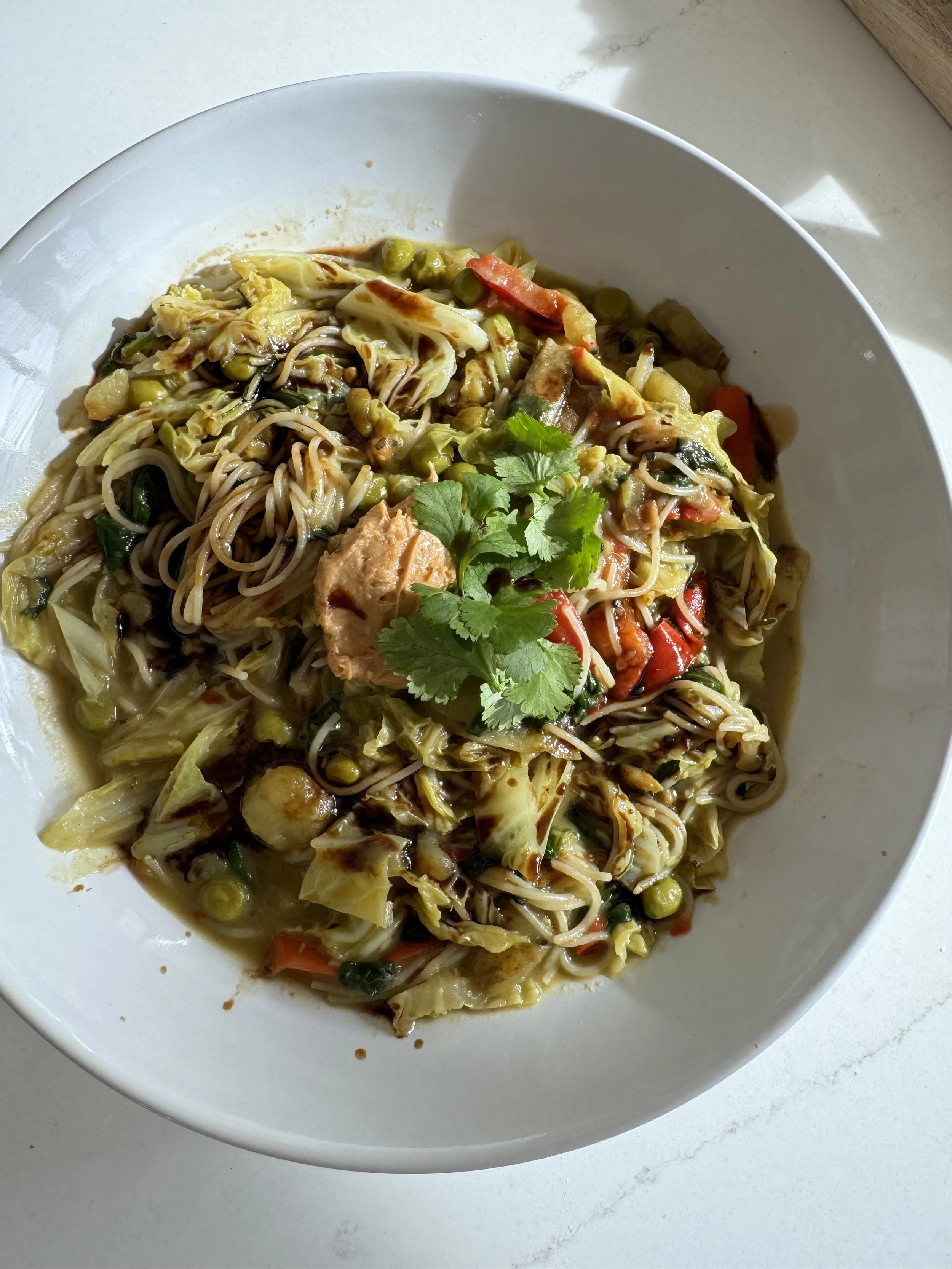Thai coconut noodles
Hey, this is the first of many recipes I’ll be sharing with you, and I’m genuinely excited for you to try my food.
My relationship with cooking changes all the time. Some weeks you’ll find me baking bread and making nut milk from scratch; other weeks it’s a simple bowl of pasta. But one thing always stays the same: my approach is rooted in health. I never use ingredients that don’t serve the body. Everything I choose has a purpose.
There are a few ingredients we should all be avoiding (I’ll get into that in another post), but here’s one thing to start with. Always choose organic when you can. It’s one of the simplest ways to avoid harmful insecticides, herbicides, and the toxic residues that affect our health far more than most people realise. Choosing organic means choosing cleaner food and supporting a healthier body and environment.
I’ve been craving noodles lately and wanted something hearty yet simple, so I came up with this recipe. It’s gluten-free, plant-based, easy to make, budget-friendly, and genuinely delicious.
Let’s cook.
This recipe makes around 5-6 servings, so if you’re cooking for fewer people or want to make a larger batch, simply adjust the ingredients to suit your needs. You can also customise the recipe by adding your favourite vegetables—these are just the ones I love in a curry. (Also, I’m obsessed with cabbage!)
Ingredients
1 large white onion
4 cloves garlic, minced
3-inch piece of ginger, finely grated
Potatoes (I leave the skin on)
1 large red pepper
Kale
Frozen peas
Cherry tomatoes
Cabbage
Nigella seeds
Coriander seeds
Ground cumin
Ground coriander
Paprika
Cayenne pepper
Curry powder
Dried thyme
Turmeric
Vegetable stock (look for one without sugar or yeast)
Peanut butter
Coconut aminos or Tamari (gluten-free soy sauce)
1 Tin coconut milk (always organic)
Rice noodles (i used brown rice and wake noodles)
Feel free to mix and match your favourite spices and veggies to make this curry your own!
Method
Start Cooking
Heat a large saucepan with coconut oil (preferably one with a lid).
Chop your onion into large pieces and add to the pan. Sauté until they begin to brown.
Add 1 teaspoon each of coriander seeds and nigella seeds.
Prepare and Add Potatoes
Chop the potatoes into small chunks, leaving the skin on.
Once the onions are browned, stir in the potatoes.
Add 1 teaspoon of each spice: ground cumin, ground coriander, turmeric, paprika, thyme, and a pinch of cayenne pepper for heat. Adjust the curry powder and cayenne to your liking. Stir well to coat the potatoes thoroughly in the spices.
Add Red Pepper
Chop the red pepper and add it to the pan.
Cook the potatoes and pepper together, stirring frequently to prevent sticking, allowing the potatoes to absorb all the flavours.
Prepare the Stock and Coconut Milk
Boil 1 litre of bottled water and dissolve 2 stock cubes (or use fresh vegetable stock if you have it).
Add a small amount of stock to the pan to deglaze and prevent sticking. Then, pour in the coconut milk and mix well.
Season with salt and pepper to taste.
Cook the Potatoes
Top up the pan with stock until it’s about 2 inches above the potatoes.
Cover the pan with a lid and cook on high heat for about 15 minutes or until the potatoes are nearly soft.
Add Veggies
Once the potatoes are almost cooked through, reduce the heat to medium and add the cherry tomatoes, frozen peas, kale and chopped cabbage. Option to add a spoon of peanut butter ;-)
Cook for another 15 minutes, allowing the flavours to combine.
Cook the Noodles
Prepare your noodles separately for the best texture.
Boil the desired amount of gluten-free noodles in a separate pan according to the package instructions (typically 5 minutes).
Drain the noodles and add them to your serving dish.
Assemble and Serve
Top the noodles with your curry.
Add a teaspoon of peanut butter on top, drizzle with coconut aminos or tamari, and garnish with fresh coriander, or not!
Enjoy this hearty, plant-based curry — full of flavour, comfort, and nourishment.
If you have any questions, feel free to reach out. I always love hearing from you. And if you make this recipe, tag me on Instagram @thehealthjunki I’d love to see your take on it. 🌿🌿
Enjoy, Nad x

